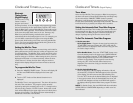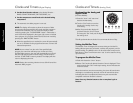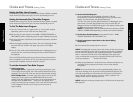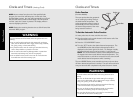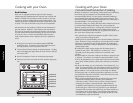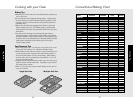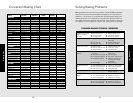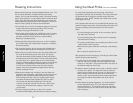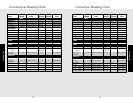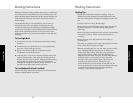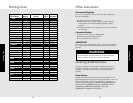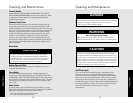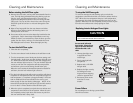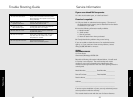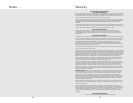
38 39
Control Knobs
MAKE SURE ALL THE CONTROL KNOBS POINT TO THE OFF
POSITION BEFORE REMOVING. Pull the knobs straight off. Wash
in detergent and warm water. Dry completely and replace by
pushing firmly onto stem.
Stainless Steel Parts
All stainless steel body parts should be wiped regularly with hot
soapy water at the end of each cooling period and with a liquid
cleaner designed for that material when soapy water will not do the
job. Do not use steel wool, abrasive cloths, cleansers, or powders. If
necessary, scrape stainless steel to remove encrusted materials,
soak the area with hot towels to loosen the material, then use a
wooden or nylon spatula or scraper. Do not use a metal knife,
spatula, or any other metal tool to scrape stainless steel. Do not
permit citrus or tomato juice to remain on stainless steel surface, as
citric acid will permanently discolor stainless steel. Wipe up any
spills immediately.
Brass Parts
Broiler Pan and Grid
Clean with detergent and hot water. For stubborn spots, use a
soap-filled steel wool pad.
Oven Racks
Clean with detergent and hot water. Stubborn spots can be
scoured with a soap-filled steel wool pad. DO NOT CLEAN THE
OVEN RACKS USING THE SELF-CLEAN CYCLE. They could sustain
damage due to the extreme heat of the Self-Clean cycle. The oven
rack supports are designed to remain in the oven during the Self-
Clean cycle.
Meat Probe
The meat probe may be cleaned with soap and water or a soap-
filled scouring pad. Cool the probe before cleaning. Scour stubborn
spots with a soap-filled scouring pad, rinse and dry.
• Do not immerse the meat probe in water.
• Do not store the probe in the oven.
Cleaning and Maintenance
CAUTION
All special ordered brass parts are coated with an epoxy coating.
DO NOT USE BRASS CLEANERS OR ABRASIVE CLEANERS ON
ANY BRASS PARTS. All brass body parts should be wiped regularly
with hot soapy water. When hot soapy water will not do the job,
use every day household cleaners that are not abrasive.
Product Care
Product Care
Cleaning and Maintenance
CAUTION
WARNING
Do not touch the exterior portions of the oven after self-cleaning cycle
has begun, since some parts become extremely hot to the touch!
During the first few times the self-cleaning feature is used, there may
be some odor and smoking from the curing of the binder in the high-
density insulation used in the oven. When the insulation is thoroughly
cured, this odor will disappear. During subsequent self-cleaning cycles,
you may sense an odor characteristic of high temperatures. Keep the
kitchen well-vented during the self-cleaning cycle.
Self-Clean Cycle
This oven features an automatic pyrolytic self-cleaning cycle.
During this cycle, the oven reaches elevated temperatures in
order to burn off soil and deposits. An integral smoke eliminator
helps reduce odors associated with the soil burn-off. A powder
ash residue is left in the bottom of the oven after completion of
the Self-Clean cycle. The door latch is automatically activated after
selecting the Self-Clean setting. The latch ensures that the door
cannot be opened while the oven interior is at clean
temperatures.
Burn or Electrical Shock Hazard
Make sure all controls are OFF and oven is COOL before
cleaning. Failure to do so can result in burns or electrical shock.
DANGER
To Prevent Personal Injury
Before removing the doors, make sure the pins are properly
installed in the hinges. Failure to do so can result in
personal injury to hands and/or fingers.



